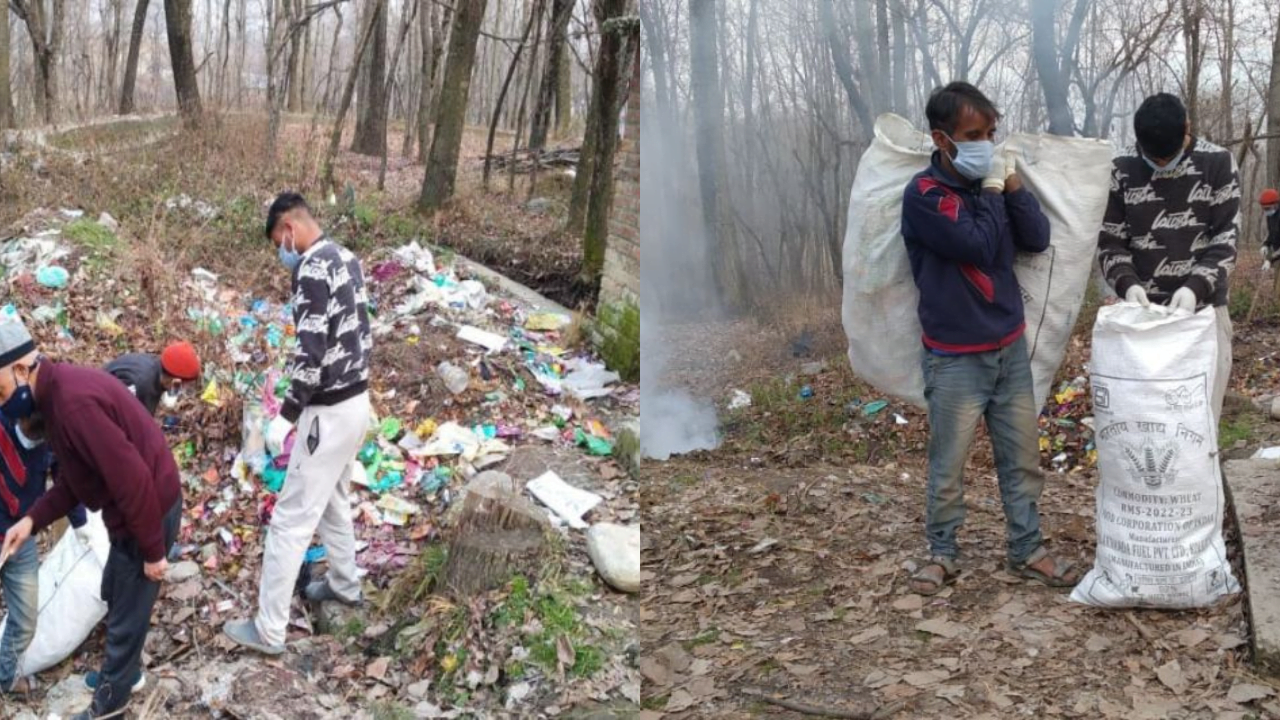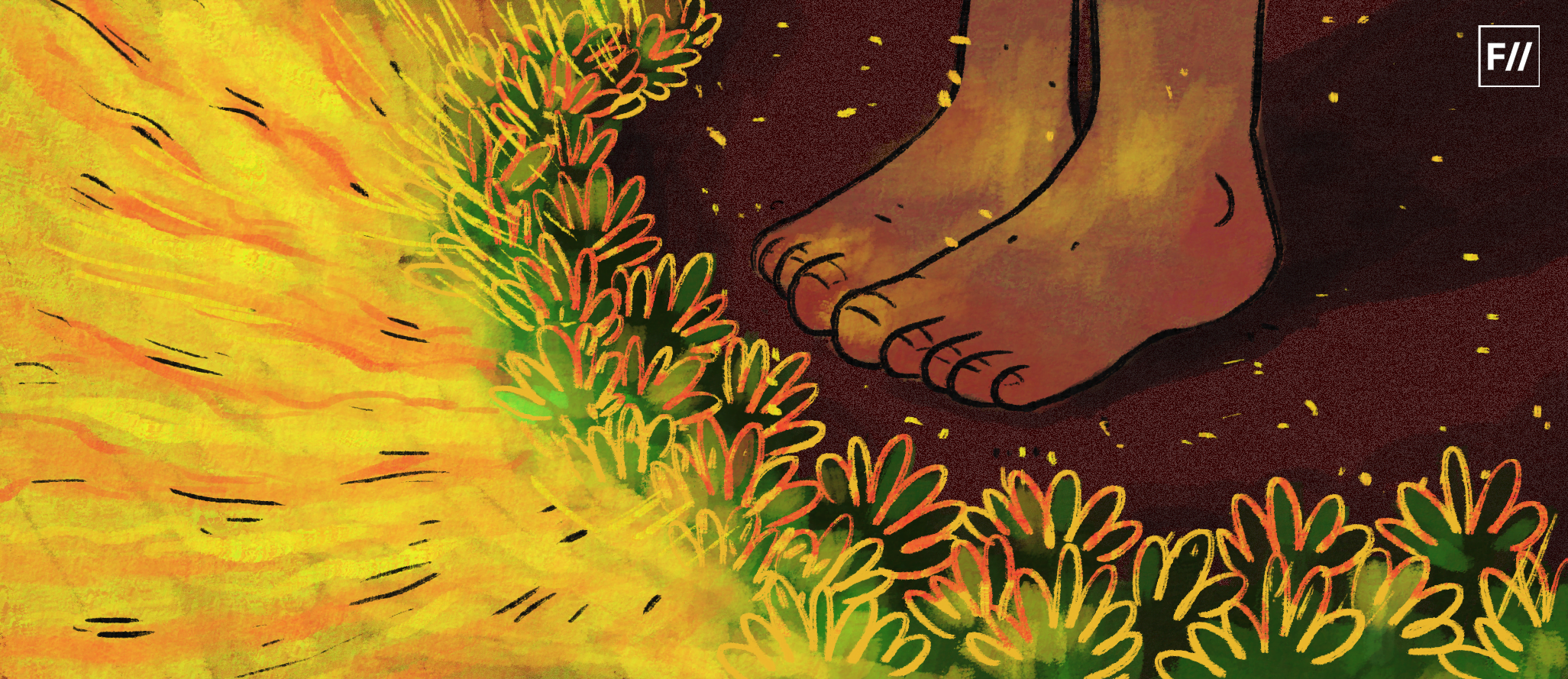By Sameer Ahmad
At a time when the Central government has banned several single-use plastic items to reduce littering, Sadiwara-A village panchayat in Hiller Shahabad block of South Kashmir’s Anantnag district has come up with a unique idea of offering a gold coin for collecting plastic waste.
Sarpanch Farooq Ahmad Ganie, an advocate, devised the ‘Give Plastic and Take Gold‘ campaign to cope with the challenges in solid waste management. Under the scheme, any person collecting 20 quintals (2,000 kg) of plastic waste from the village will get a 10 gm gold coin. There is also a smaller reward of 5 gm for 10 quintals.
Unfortunately, this cannot be a lasting solution to the waste menace as the plan does not involve measures to curb plastic use. If at all a success, it can only promote plastic wastage as individuals get rewards for collecting waste, and not for adopting a sustainable way of life.
However, Ganie reasoned that people needed some motivation even for collecting waste. “Their mindset should change in such a way that they collect plastic instead of throwing it into rivers or vacant plots. This is as important as shunning plastic because the accumulation of such wastes is directly linked with water and land degradation. We cannot let our rivers choke and dry up by not taking timely action,” Ganie told 101Reporters.
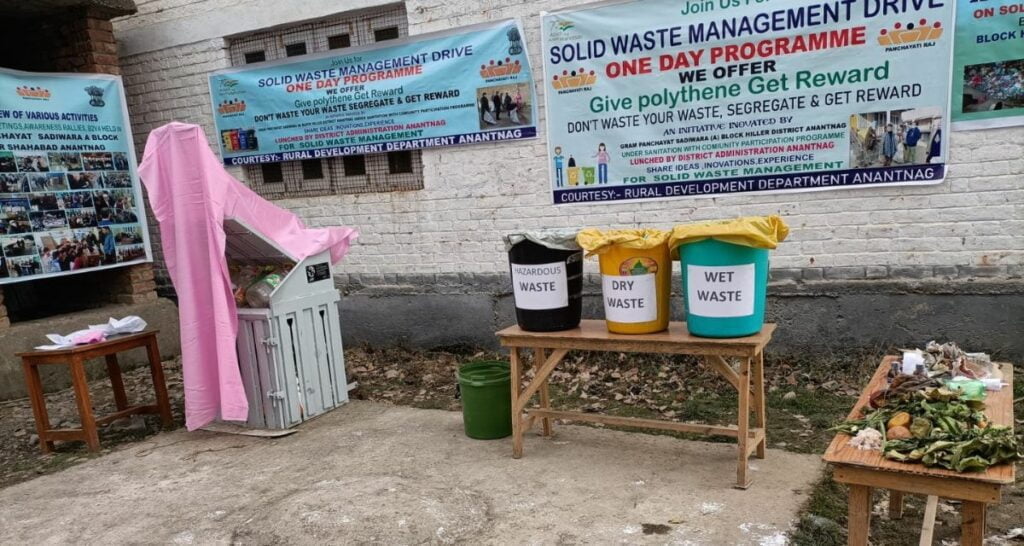
He said the gold coin idea had the approval of Dr Basharat Qayoom, Deputy Commissioner (DC), Anantnag. “We discussed it with the DC, and he was very supportive and appreciative. He formally launched the campaign at a function organised by the rural development department on January 7, 2023.“
Things picked up pace when the village administration organised three community participation programmes within 15 days of the campaign launch and cleaned up at least 10 spots within an area of one km in Sadiwara. A local river, Pranigam, originating from the centuries-old Vatsta spring, was also cleaned.
Unfortunately, this cannot be a lasting solution to the waste menace as the plan does not involve measures to curb plastic use. If at all a success, it can only promote plastic wastage as individuals get rewards for collecting waste, and not for adopting a sustainable way of life.
In a bid to raise awareness about the campaign aimed at making the village green and clean by year-end, the Sadiwara administration enlisted at least 30 volunteers, including members of youth clubs, local awqaf bodies, senior citizens and irrigation department employees, to clean rivers and roads. They were honoured with mementoes for their work.
Social media, a public address system and spreading the word through masjids were all part of the plan. Presently, the gram panchayat does not have a proper system to dispose of plastic waste. Through the gold coin campaign, the civic body plans to streamline waste collection and disposal.
“We will adopt a systematic waste disposal strategy and will supply to factories… Three cloth bags will be given to each household for their daily use. Even raddiwalas (recyclable waste collectors) can collect 10 or 20 quintals of plastic and earn a gold coin,” said Mohd Afzal Bhat, a member of ward number 7 of the panchayat.
Asked about the funding of the gold coin, he replied, “We have started collecting a user fee of Rs 30 each from the over 400 households present in the village. There is also a plan to collect a construction fee of Rs 3 to 5 per square foot on new constructions. Moreover, the panchayat gets an annual PRI Capex of Rs 23 lakh from the central government through UT administration which is used to develop the infrastructure of the village.“
Social media, a public address system and spreading the word through masjids were all part of the plan. Presently, the gram panchayat does not have a proper system to dispose of plastic waste. Through the gold coin campaign, the civic body plans to streamline waste collection and disposal.
Bhat said they would use the residual balance in the panchayat account to buy an automatic electric baling machine, which has a better capacity than the two manual machines presently in use. The purchase of a machine to make plastic tiles from polythene is also on the anvil. The larger plan is to use the tiles to beautify village lanes.
Meanwhile, Qayoom told 101Reporters that the panchayat was turning plastic waste into compact packages of specific sizes using the hydraulic press system in the manual machines provided by the administration. The machines cost around Rs 60,000 each. “Apart from employing these machines, the panchayat ensures full cooperation of youth and other stakeholders in the cleanliness mission, which is a good step.“
Administrative backing needed
Rao Farman Ali, a researcher, author and social entrepreneur, felt that plastic littering has affected agriculture, the main economic activity of the rural populace in the Anantnag district. Polythene menace has brought down the fish population in the Lidder, Arpath, Bringhi, Sandran and Vishav rivers that flow through the district, thereby affecting the livelihood of the Hanji community.
“The sarpanch’s novel approach is commendable, but administrative support is what matters the most. Right now, the administration has a look-busy-do-nothing approach. It is not clear how the plan will be executed. Neither the coordination process between executing agencies is clearly outlined nor are the villagers properly sensitised. The sense of ownership, which is beyond any reward, is missing in this idea,” Ali opined.
Dr Mohammad Rashid-ud-din Kundangar, former director (research and development), of Jammu and Kashmir Lakes and Waterways Development Authority, told 101Reporters that grassroots-level work with a focus on proper methods to discard or recycle wastes, as prevalent in Western countries, was needed. A multi-pronged approach to implement a strict plastic ban and measures to reuse plastic or introduce recycled plastic should go hand in hand, he said.
Dr Kundangar informed that an investigation that he carried out in an individual capacity five years ago had found that Anantnag town generated 57 cubic meters of solid wastes, mostly polythene bags, every day. However, the town area committee collected only 18 cubic metres daily, only to dump it near Eidgah or under the bridges.
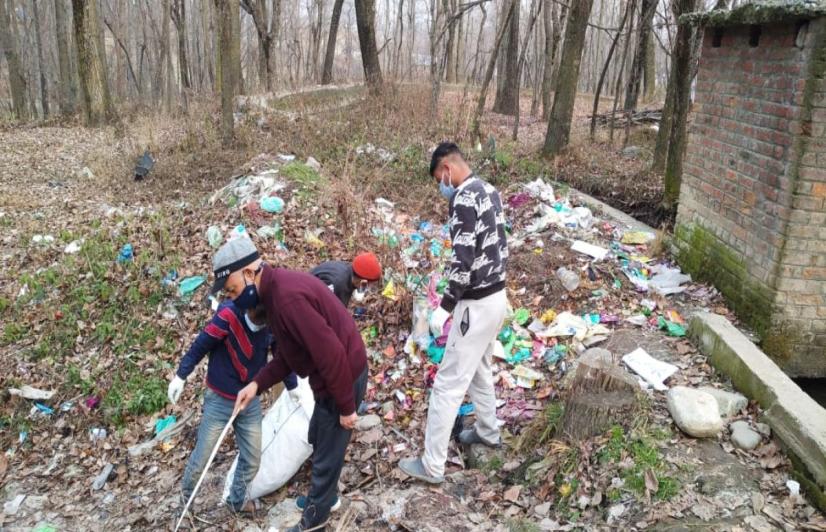
“If villages take up solid waste management, the result will be clean freshwater springs and streams. Vacant lands and wastelands will also be freed from heaps of solid wastes,” he said.
Lauding the initiative, Abdul Basit Reshi, Assistant Professor in Environmental Science at Government Degree Collage Dooru in Anantnag, said, “We are safe as long as our environment is safe and pollution-free. This initiative will definitely work, especially because people are very fond of gold.”
Looking forward
Sadiwara is the first panchayat in Jammu and Kashmir to launch the ‘Give Plastic and Take Gold‘ campaign. “It will be implemented in all panchayats of the district” Riyaz Ahmad Shah, Assistant Commissioner (Development), Anantnag, told 101Reporters.
Ward number 4 member Showkat Ahmad said the collected plastic could be melted at a high temperature and mixed with bitumen to lay roads. Volunteers and panchayat staff will segregate the collected waste and pack it according to the plastic type. These compact packages will be supplied to the recycling unit at Lethpora in Pulwama, where they will be made into granules for further use,” he explained.
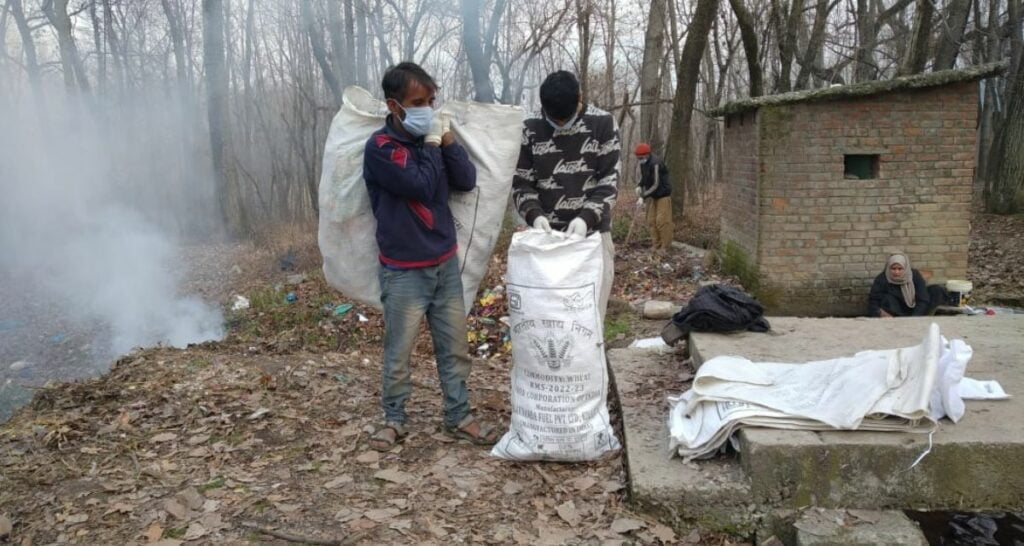
“If successful, this will be an excellent example of how small communities can make a positive impact on the environment and create a more sustainable future,” Shah hoped.
Local residents Parvaiz Ahmad and Shakeela Bano expressed happiness over how they can do their bit to protect the environment and earn from it. “It has the potential to make our society healthy and wealthy,” Ahmad claimed.
Sadiwara Youth Club’s president Wani Shakeel said locals of all age groups had shown interest when the panchayat exhorted them to collect plastic waste from garbage dumps, rivers and roads.
Sameer Ahmad is a Kashmir-based journalist and a member of 101Reporters, a pan-India network of grassroots reporters.
About the author(s)
101Reporters is a pan-India network of grassroots reporters that brings out unheard stories from the hinterland.
